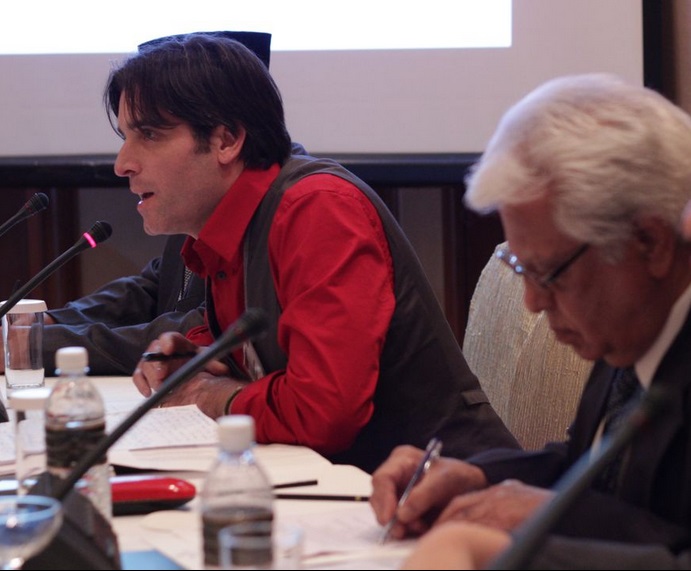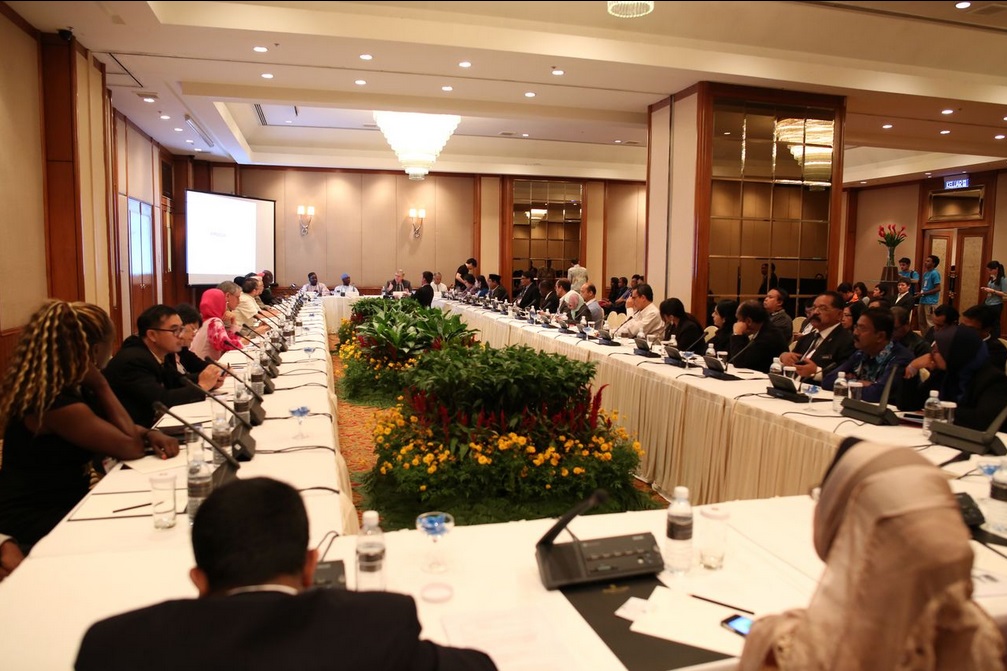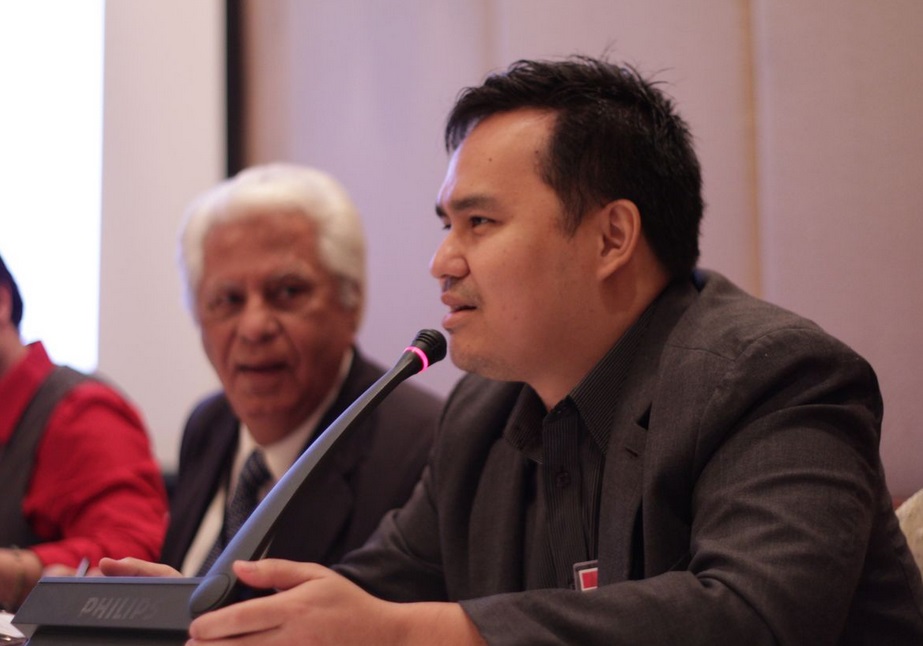
Rev. Joseph Hayab and Sheik Abdulahi Maraya, Christian and Muslim Special Advisers on Religious Affairs to the Executive Governor of Kaduna State, discuss their friendship and bonds of faith in violence-torn Nigeria.
“As an officially Muslim state which protects the rights of all people to practice their religion freely, Malaysia is positioned to have a strong positive role in the rest of the Muslim world,” said James Patton, executive vice president of the International Center for Religion and Diplomacy at a forum, “Faith Leadership for the Greater Good: Forging Unity in Diversity Based on Shared Values,” in Kuala Lumpur on December 5, 2013.
The forum, one of three convenings held just prior to the formal opening of the 2013 Global Peace Convention, included Christian and Muslim clerics and interfaith leaders from Malaysia, Indonesia, Nigeria, India, Nepal, and the United States and addressed some of the most vexing problems of conflict and instability rooted in religious extremism.
In opening remarks, Global Peace Foundation (GPF) International President James Flynn said that GPF’s motivating vision of One Family under God meant that, “despite our differences in ethnic backgrounds, or ways in which we worship or connect to the divine, we share a common origin. And because of that every human being has intrinsic value and is worthy of respect. It is our conviction that the most pressing issue of today is an ethical issue—how as part of this globalized world we work and find happiness and prosper together.
“We believe that we can exercise our ingenuity and creativity to solve problems if our motivation is correct,” Mr. Flynn said. “And there are no leaders more important to that effort than faith leaders. Despite differences, the great faith traditions speak to fundamental universal principles that are not unique possession of any one tradition.”
Finding common ground
The forum began with a moving presentation by Christian and Muslim clerics from Kaduna State in Nigeria, known whimsically as the “twins of Kaduna” for their affectionate personal relationship and evangelical commitment to publicly emphasize values shared among Christians and Muslims. “When you see me you can be sure that within five minutes you will see Sheik Maraya,” Rev. John Hayab jokingly said, adding that everything that belonged to him also belonged to his Muslim twin, excepting his wife.

James Patton (left) executive vice president of the International Center for Religion and Diplomacy, emphasizes Malaysia’s role as an Islamic nation in advancing social cohesion.
Rev. Joseph Hayab and Sheik Abdulahi Maraya, respectively Christian and Muslim Special Advisers on Religious Affairs to the Executive Governor of Kaduna State, spoke eloquently and frankly about the distrust and ignorance of Christian and Muslims about own faith traditions, which becomes the basis of animosity and conflict.
A nation of 170 million, Nigeria is divided almost equally between Christian and Muslim. Attacks by the insurgency movement Boko Harum have killed thousands of innocent people and Nigerian President Goodluck Jonathan declared a state of emergency in May in response to worsening security challenges in the northern states.
“We chose to use our God-given position to influence our community for good,” said Rev. Hayab. “It is common knowledge that Christians and Muslims live with suspicion, thinking, ‘he is not telling the truth, he is lying.’ When there is prejudice and we go back and preach about our negative conclusions sometimes this results in reactions that we cannot control. I find in Maraya a man who loves God and I love him and am proud of him. Saying negative things about Christians or Muslims is not an education; it is an incitement. How can you win people when you don’t respect them? When you don’t trust, tolerate and appreciate them.”

The forum, “Faith Leadership for the Greater Good: Forging Unity in Diversity Based on Shared Values,” included Christian and Muslim clerics and interfaith leaders from Malaysia, Indonesia, Nigeria, India, Nepal, and the United States.
“When I first met Rev. Habib agreed Sheik Maraya, “my first thought was that I have met someone from my original family, the family of Adam and Eve. The first thing expected as a Muslim is that whenever you meet another human, if younger than you, you consider him a younger brother or sister.
“From Islamic point of view, as found the Quran, there is no basis to dishonor him or her on basis of some racial, religious or tribal identification. Was there ever a time that the prophet Muhammad dishonored a person because he was practicing another religion? No. As a Muslim you are enjoined to be kind and just to all regardless of any difference, particularly religious difference. If one goes by the tenet of Islam you are expected to consider the religion of others as sacrosanct.”
Sheik Maraya said that conflict and hostility exists because the majority of Christians and Muslims are ignorant of the rudimentary teachings of their faith. “That is why they are carried away and pass judgment on the basis of sentiment. But the Quran says that even if you hate someone you must not allow that sentiment to lead to injustice to others.”
Understanding extremism
In a later session, “Mitigating Religious Extremism: Models of Interfaith in Action,” Dr. Ahmad Farouk Musa, Chairman and Director of the Islamic Renaissance Front, examined the factors that contributed to extremism and violence, saying that atrocities such as the recent brutal murder in broad daylight on a street in Great Britain by extremists who cited their Islamic faith was not at all inherent in Islam but an expressions of a mindset. In analyzing this mindset he listed “exogenous factors,” including decades of colonialism, unjust wars to promote Western interests, support for oil-rich tyrannical regimes, and drone strikes that kill innocents.
“Saying negative things about Christians or Muslims is not an education; it is an incitement. How can you win people when you don’t respect them? When you don’t trust, tolerate and appreciate them.”
He also noted “endogenous factors” such as the low quality of education of madrasas schools, and careless references to Qaranic verses taken out of context. He noted that some Islamic fundamentalists opposed democracy as nizam-u-kufr, inherently blasphemous, a usurpation of the authority that belongs to God. He called for a review of policies that feed fanaticism and a clarification among Muslims of the concept of jihad, which has been misinterpreted and undermines the fundamental character of Islam as a religion of peace.

Mr. Ahmad Fuad Rahmat, managing editor of Project Dialog in Malaysia.
A final panel, Creating Unity in Diversity in Asia: Including Others in Our Sphere if Moral Obligation,” explored Asia’s religious experience and challenges in accommodating diverse faiths. Dr. Marsudi Syuhud, General Secretary of the Central Board of Nahdlatul Uluma, Indonesia’s largest Muslim organization with some 50 million members, likened faith and public life to one’s home.
“In our home we have many rooms, there are private rooms and there are public room. If a guest comes in and goes directly to a private room, the owner of the house may be angry with him. The private room in Islam we call theology. In a public room everyone can come in and sit together, the room of social, public relations.
Mr. Ahmad Fuad Rahmat, managing editor of Project Dialog in Malaysia, said that of all human emotions, fear persists and often dominates, perhaps in part because of biological vulnerability. “Humans have no fangs, no claws, no shells,” he said. “The question is, can religion be an anecdote to fear?”
Humility he said is a starting point. Recognizing the miniscule time frame of human presence on earth in relation to the billions of years of life that preceded it, he said that a faith perspective should acknowledge the vast scope and sweep of time and bring perspective and sobriety to impulsive responses to differences among faiths and cultures.
The Global Peace Convention, “Unity in Diversity: Building Social Cohesion through Universal Aspirations, Principles and Values,” is sponsored by the Global Peace Foundation and Malaysia’s Department of National Unity and Integration. It convenes from December 5-8 at the Shangri-la Hotel in Kuala Lumpur.
– See more at: http://www.globalpeace.org/newsapp/preconvention-forum-emphasizes-faith-leadership-shared-values-in-building-social-cohesion#sthash.0K71eC8u.dpuf






